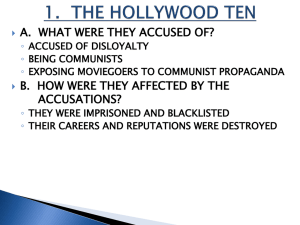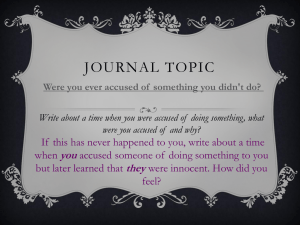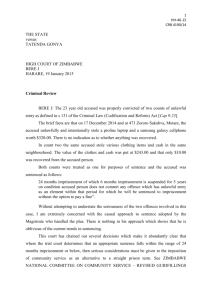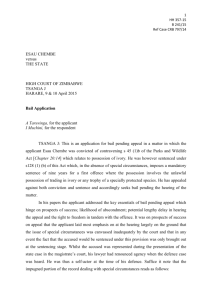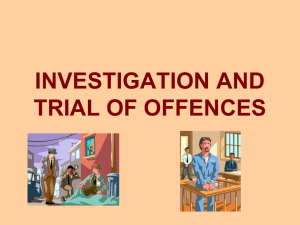THE HIGH COURT OF DELHI AT NEW DELHI SUBJECT
advertisement
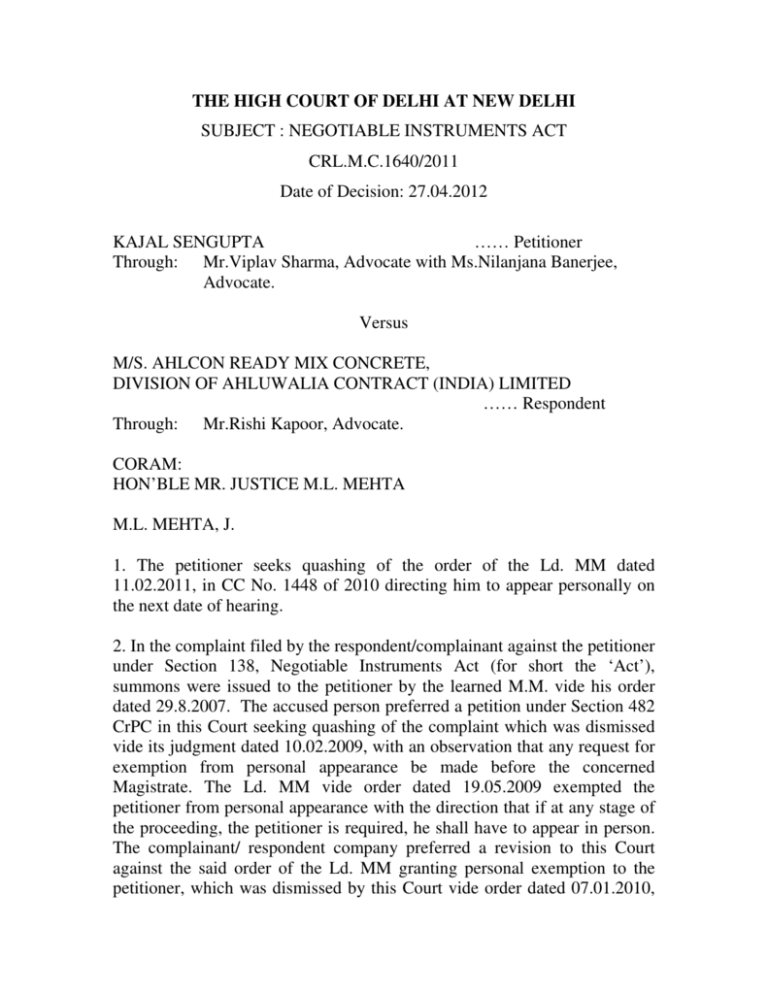
THE HIGH COURT OF DELHI AT NEW DELHI SUBJECT : NEGOTIABLE INSTRUMENTS ACT CRL.M.C.1640/2011 Date of Decision: 27.04.2012 KAJAL SENGUPTA …… Petitioner Through: Mr.Viplav Sharma, Advocate with Ms.Nilanjana Banerjee, Advocate. Versus M/S. AHLCON READY MIX CONCRETE, DIVISION OF AHLUWALIA CONTRACT (INDIA) LIMITED …… Respondent Through: Mr.Rishi Kapoor, Advocate. CORAM: HON’BLE MR. JUSTICE M.L. MEHTA M.L. MEHTA, J. 1. The petitioner seeks quashing of the order of the Ld. MM dated 11.02.2011, in CC No. 1448 of 2010 directing him to appear personally on the next date of hearing. 2. In the complaint filed by the respondent/complainant against the petitioner under Section 138, Negotiable Instruments Act (for short the ‘Act’), summons were issued to the petitioner by the learned M.M. vide his order dated 29.8.2007. The accused person preferred a petition under Section 482 CrPC in this Court seeking quashing of the complaint which was dismissed vide its judgment dated 10.02.2009, with an observation that any request for exemption from personal appearance be made before the concerned Magistrate. The Ld. MM vide order dated 19.05.2009 exempted the petitioner from personal appearance with the direction that if at any stage of the proceeding, the petitioner is required, he shall have to appear in person. The complainant/ respondent company preferred a revision to this Court against the said order of the Ld. MM granting personal exemption to the petitioner, which was dismissed by this Court vide order dated 07.01.2010, with the liberty to move an appropriate application before the Ld. MM for revocation of personal exemption of the petitioner. Since the exemption from appearance of the petitioner was continuing, notice under Section 251 CrPC was framed against the petitioner through his counsel. Thereafter, the Ld. MM vide order dated 11.02.2011 directed the petitioner herein to personally appear before him for furnishing the bail bond and disclosing his defense. The petitioner being aggrieved by this order of the Ld. MM has approached this Court seeking quashing of this order and to continue to be represented through his counsel, at the trial. 3. The learned counsel for the petitioner submitted that the petitioner was granted permanent exemption from personal appearance by the Ld. MM vide order dated 19.05.2009, subject to the condition that the petitioner shall appear in person as required by the Court in “any proceeding” in the case. The requirement of “bail” do not form a part of the proceeding as contemplated by the Ld. MM. Drawing my attention to Form 45, it was submitted that the requirement of bail bonds is to ensure the presence of the accused in Court during trial, which in the present case, has already been dispensed by the Magistrate vide order dated 19.05.2009. In view of Section 205 CrPC, it is further submitted that, grant of bail or execution of bail bonds by the accused is not a sine qua non for the grant of personal exemption by the Magistrate. It was further submitted that, in view of the judgment of the Hon’ble Supreme Court in Bhaskar Industries Ltd. v. Bhiwani Denim & Apparels Ltd. & Ors, (2001) 7 SCC 401, the petitioner can be exempted from personal appearance even for the first appearance, if he is duly represented by his pleader. Further, even at the stage of the framing of notice under Section 251 CrPC, the Magistrate is empowered to record the plea of the accused when his counsel makes such plea on behalf of the accused in a case where the personal appearance of the accused has been dispensed with. In support of his contention, the learned counsel relies upon M/s Chowriappa Construction v. M/s Embassy Contructions & Development, 2002 CriLJ 3863, V.S. Reddy v. M/s Excel Glasses Ltd,. 2010 CriLJ 4171, S.V. Mazumdar & Ors. v. Gujarat State Fertilizers & Anr, (2005) 4 SCC 173, Sushil Kumar Gupta v. State of Jharkhand, 2005 CriLJ 440, VIshwa Nath Kiloka v. 1st Munsif Lower Criminal Court, 1989 CriLJ 2082, R.P. Gupta v. State of M.P., 2007 CriLJ 205, Ajit Kr Chakraborty v. Serampore Municipality, 1989 CriLJ 523, Helen Rubber Industries Kottayam v. State of Kerala, 1973 CriLJ 262. The sum and substance of the contentions of the learned counsel for the petitioner is that after the grant of personal exemption from appearance of the accused, the Magistrate becomes functus officio and cannot withdraw the exemption so granted and that the requirement of bail does not form part of proceedings within the ambit of Section 205 (2) or 317 (1) CrPC. 4. Per Contra, it was submitted by the learned counsel for the respondent/complainant that the order of the Magistrate granting exemption from personal appearance or requiring the personal appearance during the proceedings of trial was an interlocutory order and the same being a discretionary power, the grant of exemption could not be claimed as a matter of right. It was submitted that, FORM 47 warrants forfeiture of such amount in case of failure of the accused to appear in Court. However, this cannot be effected without the accused furnishing bail bonds. It is further submitted that, the obligation of furnishing bail bonds and surety at the time of granting of bail is to ensure that the accused remains present, if convicted, for the offence. It is further submitted that the petitioner is the managing director of the accused company, and the liberty granted to the petitioner by the Ld. MM has been misused by the petitioner by seeking repeated adjournments. 5. I have heard the learned counsel for the parties and perused the case laws cited by the parties. 6. In the present petition, a short question of law arises for adjudication being, “whether the grant of permanent personal exemption by the Magistrate to the accused, in a bailable offence, be understood and construed to having dispensed with the requirement of the accused to obtain bail from the Court and whether the exemption from appearance granted by the Magistrate could not be revoked by him? 7. There cannot be any dispute that the order granting exemption was nothing but an interlocutory one and so was the order of revocation of the exemption granted. Such orders do not determine the rights of the parties finally but are of interim nature passed during the proceedings of trial. However, having regard to the fact that an interesting question of law has been raised, I have chosen to examine the legal position in this regard. 8. The law regarding grant of personal exemption to an accused under Section 138 of the Act has been discussed by the Hon’ble Supreme Court in Bhaskar Industries Ltd. (Supra), “These are days when prosecutions for the offence under Section 138 are galloping up in criminal courts. Due to the increase of inter-State transactions through the facilities of the banks it is not uncommon that when prosecutions are instituted in one State the accused might belong to a different State, sometimes a far distant State. Not very rarely such accused would be ladies also. For prosecution under Section 138 of the NI Act the trial should be that of summons case. When a magistrate feels that insistence of personal attendance of the accused in a summons case, in a particular situation, would inflict enormous hardship and cost to a particular accused, it is open to the magistrate to consider how he can relieve such an accused of the great hardships, without causing prejudice to the prosecution proceedings. Section 251 is the commencing provision in Chapter XX of the Code which deals with trial of summons cases by magistrates. It enjoins on the court to ask the accused whether he pleads guilty when the accused appears or is brought before the magistrate. The appearance envisaged therein can either be by personal attendance of the accused or through his advocate. This can be understood from Section 205(1) of the Code which says that whenever a magistrate issues a summons, he may, if he sees reason so to do, dispense with the personal attendance of the accused and permit him to appear by his pleader. Thus, in appropriate cases the magistrate can allow an accused to make even the first appearance through a counsel. The magistrate is empowered to record the plea of the accused even when his counsel makes such plea on behalf of the accused in a case where the personal appearance of the accused is dispensed with. Section 317 of the Code has to be viewed in the above perspective as it empowers the court to dispense with the personal attendance of the accused (provided he is represented by a counsel in that case) even for proceeding with the further steps in the case. However, one precaution which the court should take in such a situation is that the said benefit need be granted only to an accused who gives an undertaking to the satisfaction of the court that he would not dispute his identity as the particular accused in the case, and that a counsel on his behalf would be present in court and that he has no objection in taking evidence in his absence. This precaution is necessary for the further progress of the proceedings including examination of the witnesses.” 9. The purpose for permanently dispensing with the personal appearance of the accused in a summons case, is to prevent the accused from undue hardship and cost in attending the trial. The Magistrate in his judicial discretion may, in a summons case, permanently exempt the accused from his personal appearance at the trial and to be duly represented by his pleader. However, such exemption is not absolute and is subject to certain conditions, as may be imposed by the Magistrate to ensure that the prosecution proceedings are not prejudiced. Further, sub-section (2) of Section 205 CrPC and also sub-section (1) of Section 317 CrPC, empower the Magistrate to direct the personal attendance of the accused, at any stage of the proceeding, if necessary. 10. The purpose of attendance of the accused at the trial is not merely a formality or compulsion, but for the reason that the trial be allowed to be conducted in an expedient manner and is not hampered or prejudiced in the absence of the accused. However, if the Magistrate in the facts and circumstances of the case, is of the view that great hardship and inconvenience shall be caused to the accused, he shall dispense with the personal attendance of the accused and allow him to be represented by a pleader. He shall, however, keep in mind, that such personal exemption from appearance shall not delay or hamper the trial. Therefore, while granting permanent exemption from appearance, he is deemed to have reserved his right to call the accused person to appear in person at the trial, at any stage of the proceeding, if necessary. 11. The concept and purpose of securing bail by the accused person from the concerned Court is mutually exclusive to the purpose of grant of personal exemption from appearance. It is a part of court proceeding when a person is enlarged on bail by the Court, with an undertaking to the Court he, being an accused in the offence, shall attend the Court during trial. Furnishing of bail bonds and surety, by the accused, ensures that the accused shall abide by the conditions of bail and any subsequent order of the Court requiring his attendance in Court. On the other hand, personal exemption from appearing can be requested by the accused to the Magistrate, either permanently or on a particular date. The Magistrate may, subject to certain conditions and directions, allow the personal exemption of the accused. However, such permanent personal exemption cannot be construed or understood to be a blanket order dispensing with the appearance of the accused and shall be subject to Section 205 (2) and Section 317 (1) of the CrPC. 12. Now, if at any subsequent stage, the Magistrate desires the presence of the accused person, he may summon him to appear in-person, and in failure to do so, he may take coercive steps by forfeiting the bail bond or attach his movable property. This procedure, could only be effective if the accused had previously surrendered to the Court and obtained bail by furnishing bail bond and surety. The two proceedings, which are apparently independent, seem to converge at this juncture. 13. Therefore, the processes of bail and personal exemption from appearance, broadly operate in different spheres of the trial, though are intrinsically connected. 14. Further, this Court, in the case of S.S. Mann v. I.C.I.C.I Bank, Crl M.C. No. 3538/ 2009, while allowing permanent exemption to the accused person imposed the following conditions, “Since in the instant case, the petitioner is fairly advanced in age, I feel that this is a fit case where the petitioner ought to be granted permanent exemption from appearance in Court subject to the following conditions:1) That he shall put in appearance before the Court and get himself bailed out unless and until he has already done so earlier. 2) That the petitioner shall file an undertaking before the Court to the effect that he shall not dispute his identity before the Court and after such an undertaking is filed then the same has to be approved by the Court. 3) That he shall appear on each and every date of hearing as and when the trial Court directs him to do so.” 15. Therefore, in view of the above observations and judicial pronouncements, it can be concluded that, obtaining bail by the accused person is an independent requirement and grant of permanent personal exemption from appearance in Court, cannot usurp the requirement of obtaining bail by the petitioner. 16. Reliance of the learned counsel for the petitioner on Bhaskar Industries (Supra), contending that the accused person may be exempted from personal appearance at the very first hearing, cannot be interpreted to be exempting the accused from obtaining bail from the Court. Further, all the cases relied upon by the petitioner’s counsel are clearly distinguishable on facts and do not touch upon the requirement of obtaining Court bail by the accused person, which is the question proposed to be dealt in the present petition. 17. In view of the above observations, I find no infirmity in the order of the Ld. MM. 18. The petitioner shall appear in person on the next date of hearing before the trial Court and obtain bail as per law. 19. The petition is dismissed. 20. Copy of this order be circulated amongst the Judicial Officers presiding Criminal Courts. Sd/M.L. MEHTA, J. APRIL 27, 2012





